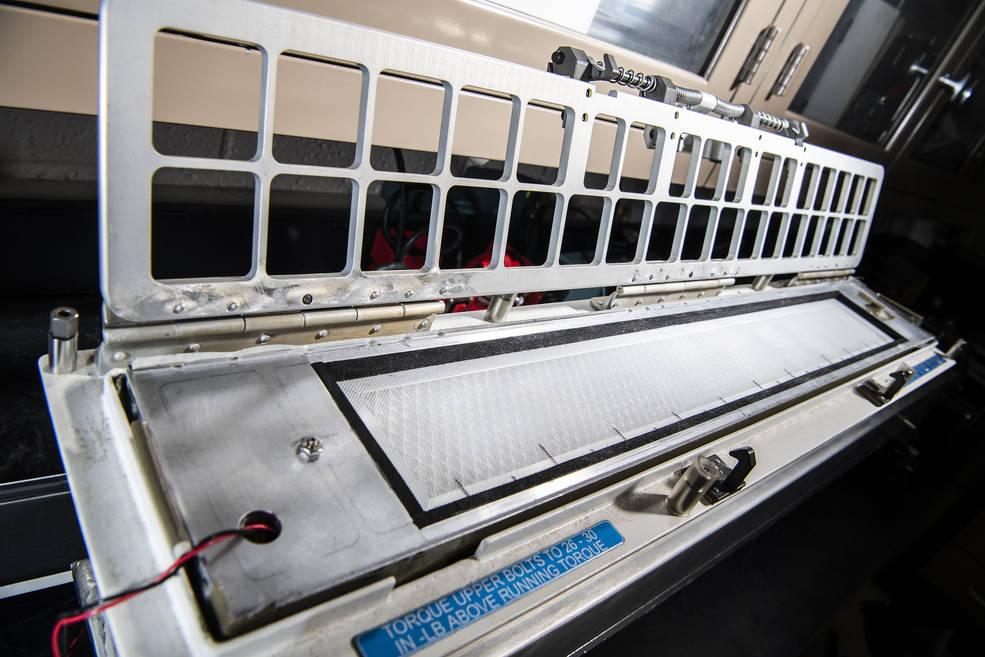© Copyright 2020 Foshan Membrane Technology Co., Ltd. All rights reserved. Sitemap

A Multi-Stage Filtration System for the International Space Station that collects dust and other particulates was invented by Glenn’s Juan Agui.Credits: NASA/Jordan Salkin
From grimy dirt and dangerous bacteria to tiny spores and pollen grains, air filters remove harmful particles from the air we breathe. But changing filters once they’re soiled can prove time-consuming, costly, and complicated — especially in space.
On spacecraft, air filter systems must be cleaned constantly. To get the job done easier, NASA invented a technology called the Multi-Stage Filtration System, designed to limit the number of replacement filters NASA needs to bring to space and reduce the time astronauts spend maintaining them.
Now, a former NFL Raiders player is using this long-lasting, automated technology to improve air filtration here on Earth. Aaron Wallace has licensed NASA’s filtration system and launched a new startup named Onedrus, aimed at serving large institutions with hard-to-access filters in multiple buildings, like schools and universities.
Onedrus’ air filter, essentially a sheet-metal frame with coarse, fabric filter material pleated inside, can intercept ultrafine particles only a few microns big. The filter — adapted from technology invented by Juan Agui and Rajagopal Vijayakumar at NASA’s Glenn Research Center in Cleveland — can be retrofitted to commercial buildings’ ductwork and HVAC systems.
Users can check how dirty the filter is remotely via a computer. With one click, the soiled filter will roll up, and fresh, clean filter material will scroll in to take its place.
“You can change your filters with the press of a button,” Wallace said.
After retiring from football, Wallace attended an NFL Players Association Technology Transfer bootcamp program at NASA’s Johnson Space Center. He then participated in NASA’s FedTech Startup Studio in 2020, a virtual program hosted by NASA Glenn to help entrepreneurs explore startup formation.
“Finding entrepreneurship was a turning point for me, finding something that made me motivated, something that gave me that drive again,” Wallace said. “Towards the end of my football career, that was something I had lost.”
From there, he was paired with the air filter invention, secured a startup license for NASA’s patents, and began developing his product.
Wallace isn’t the only one working to commercialize NASA technology. Plenty of other inventions intended for space applications have already made people’s lives better here on Earth, with others continuously being developed. Memory foam, superelastic tires, baby formula, and cell phone cameras are just a few examples.
“Some of these technologies are so forward-thinking, so innovative and so useful that they can be spun into other products that can go on and be exploited for other purposes,” said Jeanne King, technology manager for NASA Glenn’s Technology Transfer Program. “We just need people to open their minds and say, ‘What are the possibilities?’”
NASA Glenn’s Technology Transfer Program has about 200 technologies in its catalog that are available for licensing. The program had its best year yet in 2022, with 32 new licenses executed for 55 different patents and patents pending.
Creating a startup can present many hurdles and risks, but Wallace keeps pushing through because he’s drawn to the challenge.
“I think it comes from sports and football and trying to make it to the NFL for so long, chasing this dream that people told me was impossible,” Wallace said.
And NASA Glenn’s Technology Transfer Program has provided support during every step of Wallace’s journey, helping connect him to regional resources like partnerships and business pitch competitions. Onedrus has won several of them.
Onedrus’ prototype has undergone rigorous testing, with Wallace’s team working to make it thinner, lighter, and more durable so it can last for a decade without replacement. And Wallace isn’t ready to stop at this invention.
“Hopefully one day when I’ve accomplished my goals with the air filter, I can go back into the NASA patent catalog and do it again,” he said.
Wallace says he’s an example that anyone who wants to be entrepreneur can do well with the right resources and support, and that working with NASA Glenn has been extremely rewarding.
“I’d like to contribute to the portfolio, be able to say I took a NASA technology and made it successful,” Wallace said. “I think it’s really cool, how much NASA technology is helping everyday people.”
NASA has a long history of transferring technology to the private sector. The agency’s Spinoff publication profiles NASA technologies that have transformed into commercial products and services, demonstrating the broader benefits of America’s investment in its space program. Spinoff is a publication of the Technology Transfer program in NASA's Space Technology Mission Directorate.
Ellen Bausback
NASA’s Glenn Research Center
Editor: Kelly Sands
Article Source:https://www.nasa.gov/feature/glenn/2023/former-football-player-revamps-nasa-air-filter-invention